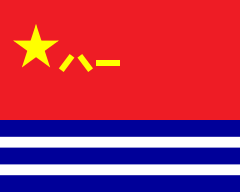Djibouti is a country in the Horn of Africa. It is bordered by Somalia to the southeast, Eritrea and the Red Sea to the north and northwest, Ethiopia to the west and south, and the Gulf of Aden to the east.

The Djibouti Armed Forces are the military forces of Djibouti. They consist of the Djiboutian National Army and its sub-branches the Djiboutian Air Force and Djiboutian Navy. As of 2018, the Djibouti Armed Forces consists of 20,470 ground troops, which are divided into several regiments and battalions garrisoned in various areas throughout the country. The Djibouti Armed Forces are an important player in the Bab-el-Mandeb and Red Sea.

The People's Liberation Army Navy, also known as the People's Navy, Chinese Navy, or PLA Navy, is the maritime service branch of the People's Liberation Army.

Ismaïl Omar Guelleh is the current President of Djibouti. He has been in office since 1999, making him one of the longest-serving rulers in Africa. He is often referred to by his initials, IOG.

Camp Lemonnier is a United States Naval Expeditionary Base, situated next to Djibouti–Ambouli International Airport in Djibouti City, and home to the Combined Joint Task Force – Horn of Africa (CJTF-HOA) of the U.S. Africa Command (USAFRICOM). It is the only permanent U.S. military base in Africa. The camp is operated by U.S. Navy Region Europe, Africa, Southwest Asia; CJTF-HOA is the most notable tenant command located at the facility as of 2008.
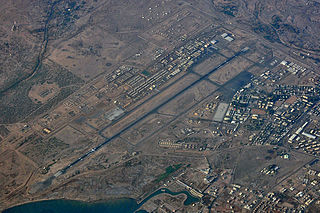
Djibouti–Ambouli International Airport is a joint civilian/military-use airport situated in the town of Ambouli, Djibouti. It serves the national capital, Djibouti. The airport is located approximately 6 kilometres from the city centre. It occupies an area of 10 square kilometers.

The Southern Theater Command Navy, or the South Sea Fleet is one of the three fleets of the Chinese People's Liberation Army Navy, operating in the South China Sea under the Southern Theater Command. It is headquartered in Zhanjiang, Guangdong Province.

The Port of Djibouti is a port in Djibouti, the capital of Djibouti. It is strategically located at the crossroads of one of the busiest shipping routes in the world, linking Europe, the Far East, the Horn of Africa and the Persian Gulf. The port serves as a key refueling and transshipment center, and is the principal maritime outlet for imports to and exports from neighboring Ethiopia. An estimated 2,500 ships pass through and call through the port every day.

Operation Enduring Freedom – Horn of Africa (OEF-HOA) is a component of Operation Enduring Freedom (OEF). The Combined Joint Task Force – Horn of Africa (CJTF-HOA) is the primary military component assigned to accomplish the objectives of the mission. The naval components are the multinational Combined Task Force 150 (CTF-150) and Combined Task Force 151 (CTF-151) which operates under the direction of the United States Fifth Fleet. Both of these organizations have been historically part of United States Central Command. In February 2007, United States President George W. Bush announced the establishment of the United States Africa Command which took over all of the area of operations of CJTF-HOA in October 2008.
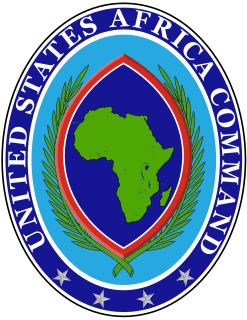
The United States Africa Command, is one of the eleven unified combatant commands of the United States Department of Defense, headquartered at Kelley Barracks, Stuttgart, Germany. It is responsible for U.S. military operations, including fighting regional conflicts and maintaining military relations with 53 African nations. Its area of responsibility covers all of Africa except Egypt, which is within the area of responsibility of the United States Central Command. U.S. AFRICOM headquarters operating budget was $276 million in fiscal year 2012.

Djibouti – United States relations are bilateral relations between Djibouti and the United States.

Djibouti, officially the Republic of Djibouti, is a country in the Horn of Africa, bordered by Somalia to the south, Ethiopia to the southwest, Eritrea in the north, and the Red Sea and the Gulf of Aden to the east. The country has an area of 23,200 km2 (8,958 sq mi).

Naval Support Activity Bahrain is a United States Navy base, situated in the Kingdom of Bahrain and is home to U.S. Naval Forces Central Command and United States Fifth Fleet.
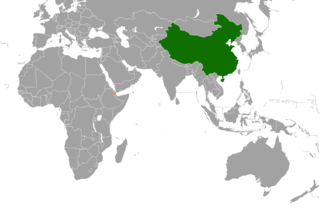
People's Republic of China–Djibouti relations refers to the current and historical relationship between the People's Republic of China and Djibouti. China and Djibouti established relations on January 8, 1979. China has financed a number of public works projects in Djibouti, including a stadium, the offices of the Ministry of Foreign Affairs and the People's Palace. In September 2010, Type 920 Hospital Ship, also known as the "Peace Ark", visited Djibouti.
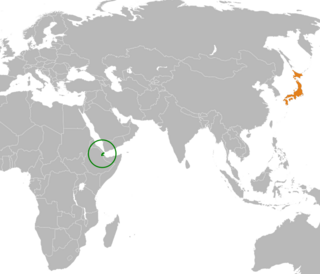
Djibouti–Japan relations are bilateral relations between Djibouti and Japan. Djibouti has an embassy in Tokyo whilst Japan has an embassy in Djibouti City.

Overseas military bases of the United Kingdom enable the British Armed Forces to conduct expeditionary warfare and maintain a forward presence. Bases tend to be located in or near areas of strategic or diplomatic importance, often used for the build-up or resupply of military forces, as was seen during the 1982 Falklands War and the use of RAF Ascension Island as a staging post. Most of the bases are located on British Overseas Territories or former colonies which retain close diplomatic ties with the British government.
The Port of Doraleh is an extension of the Port of Djibouti, located 5 km west of Djibouti City. The multipurpose port has terminals for handling oil, bulk cargo, containers and livestock. It was partially owned and operated by DP World and China Merchants Holdings, until its container facility was seized by the government of Djibouti in February 2018. There is a Chinese naval base directly adjacent to the port. China’s first overseas military base is in close proximity to the port.

The Japan Self-Defense Force Base Djibouti is a military base operated by the Japan Self-Defense Forces (JSDF) located in Ambouli, Djibouti alongside the Djibouti–Ambouli International Airport.
United States–China security cooperation refers to various projects, combined operations, communications, official dialogues, joint exchanges, and joint exercises, between agencies, groups, and individuals within the government of United States and the People's Republic of China, in a number of areas pertaining to global security, defense policy, and various forms of military and security cooperation.
